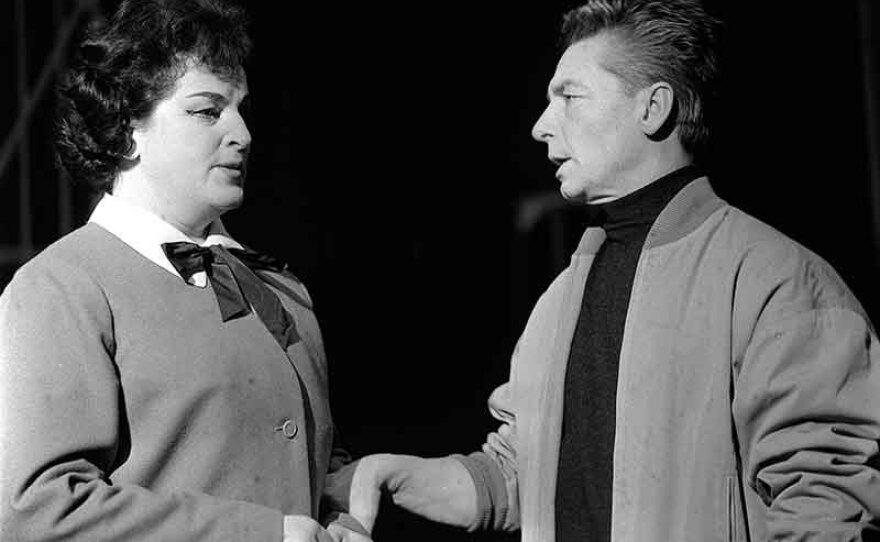—Celebrate the Life of Swedish Soprano Birgit Nilsson—
GREAT PERFORMANCES “Birgit Nilsson: A League Of Her Own” is a performance-documentary celebrating the life and career of the era-defining Swedish dramatic soprano. With her unforgettable voice, Birgit Nilsson became the face of opera in the 1950s through the 1970s.
She was best known for her groundbreaking turns in Wagner, Strauss, and Puccini operas such as "Tristan and Isolde," "Elektra," "Turandot," "Die Frau Ohne Schatten," "Tannhäuser," and "Der Ring des Nibelungen" ("The Ring Cycle").
Showcasing her powerful voice paired with her outsized personality and wit, this illuminating documentary about Nilsson’s life in the arts features rare television and archival footage highlighting her remarkable talents.
Shot in the locations that were close to Nilsson’s heart, including the Bayreuth Festival in Germany, the Vienna State Opera in Austria, the Metropolitan Opera in New York, and the farm in Båstad, Sweden where she grew up, the film also includes interviews with friends and fellow opera luminaries, including Plácido Domingo, Marilyn Horne, Nina Stemme, Jonas Kaufmann and many others.
Noteworthy Facts:
- Nilsson was born in the South of Sweden on May 17, 1918. Her mother, Justina, loved singing and could easily hit a high C, while her father Nick noticed her singing talent early and bought her a small organ.
- After leaving home in 1941, Nilsson began studying at the Royal Music Academy in Stockholm, Sweden where her teacher was Scottish lyric tenor Joseph Hislop.
- In 1946 Nilsson made her debut at the Royal Opera in Stockholm in Der Freischütz with only three days’ notice. In rehearsals, conductor Leo Blech reduced Nilsson to tears with his harsh criticism.
- In 1947, Nilsson gained national attention as Lady Macbeth, a role that is notoriously challenging for any soprano and extremely difficult for a relatively new performer. Nilsson did not perform the role again in Stockholm for 18 years.
- Nilsson made her Metropolitan Opera debut in "Tristan and Isolde" on December 18, 1959. Her performance received rave reviews, and she was featured on the front pages of the New York Times and the Herald Tribune.
- Nilsson always showed great appreciation to her fans. In 1968, Nilsson hosted a pre-Christmas party for fans in New York City, where they were treated to presents and her own cooking.
- Nilsson suffered two injuries while performing at the Met. During a performance of "Elektra" in 1971, Nilsson sprained her ankle, which resulted in the cancellation of one performance, but she recovered in time to sing in the broadcast performance of the opera. In 1974, she dislocated her shoulder during a rehearsal of "Götterdämmerung." Although she was able to sing with her arm in a sling for the first two performances, Nilsson missed subsequent performances of the opera.
- After ending her stage career, Nilsson taught popular master classes in New York, Germany and Sweden, and served as a mentor to soprano Nina Stemme.
- Nilsson established The Birgit Nilsson Foundation, awarding a prize in recognition of outstanding achievements of singers, musicians, conductors and orchestras that have sustained the highest performance standards and who have made a major contribution to music history.
- After spending her later life in Stockholm as well as in the countryside where she grew up, Nilsson passed away on December 25, 2005 and was survived by her husband Bertil Niklasson, who later passed away in March 2007.

Buzzworthy Moments:
- In a 1971 appearance on a Sveriges Television (SVT) program, Nilsson is reunited with the organ her father bought her 50 years prior and performs the Swedish folk song “Nicolina.”
- In rare footage, Nilsson is seen preparing for a performance of "Tosca" in her dressing room at the Met in 1968. Midway through, she is visited by her co-star, Italian lyric tenor Gianni Raimondi, who jokingly pleads with Nilsson “Not to kill me with your voice!”
- As her career went on, Nilsson became well known for standing up to directors as well as for her sense of humor. In 1967, Nilsson arrived at a rehearsal for "Die Walküre" with conductor Herbert von Karajan at the Met wearing a miner’s helmet decorated with Valkyrian wings in response to the production’s gloomy lighting.

Watch On Your Schedule:
This episode will be available for streaming on demand for a limited time after the broadcast - beginning March 23. Extend your viewing window with KPBS Passport, video streaming for members ($60 yearly) using your computer, smartphone, tablet, Roku, AppleTV, Amazon Fire or Chromecast. Learn how to activate your benefit now.
Join The Conversation:
GREAT PERFORMANCES is on Facebook, and you can follow @GPerfPBS on Twitter. #GreatPerformancesPBS
Credits:
A production of Wunderlich Medien GbR and The Birgit Nilsson Foundation in collaboration with Unitel. Written and directed by Thomas Voigt. Wolfgang Wunderlich is editor and co-director. For GREAT PERFORMANCES, Bill Kabel and John Walker are producers; Bill O’Donnell is series producer and David Horn is executive producer.





